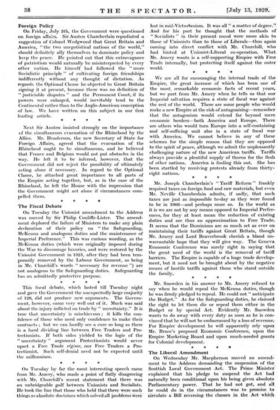On Friday, July 5th, the Government were questioned on foreign
affairs. Sir Austen Chamberlain repudiated a suggestion of Colonel Wedgwood that Great Britain and America, " the two unegotistical nations of the world," should definitely ally themselves to dominate policy and keep the peace. He pointed out that this extravagance of patriotism would naturally be misinterpreted by every other nation. He himself had followed the " more Socialistic principle " of cultivating foreign friendships indifferently without any thought of dictation. As regards the Optional Clause he objected to Great Britain signing it at present, because there was no definition of " justiciable disputes " and the Permanent Court, if its powers were enlarged, would inevitably tend to the Continental rather than to the Anglo-American conception of law. We have written on this subject in our first leading article.
































 Previous page
Previous page